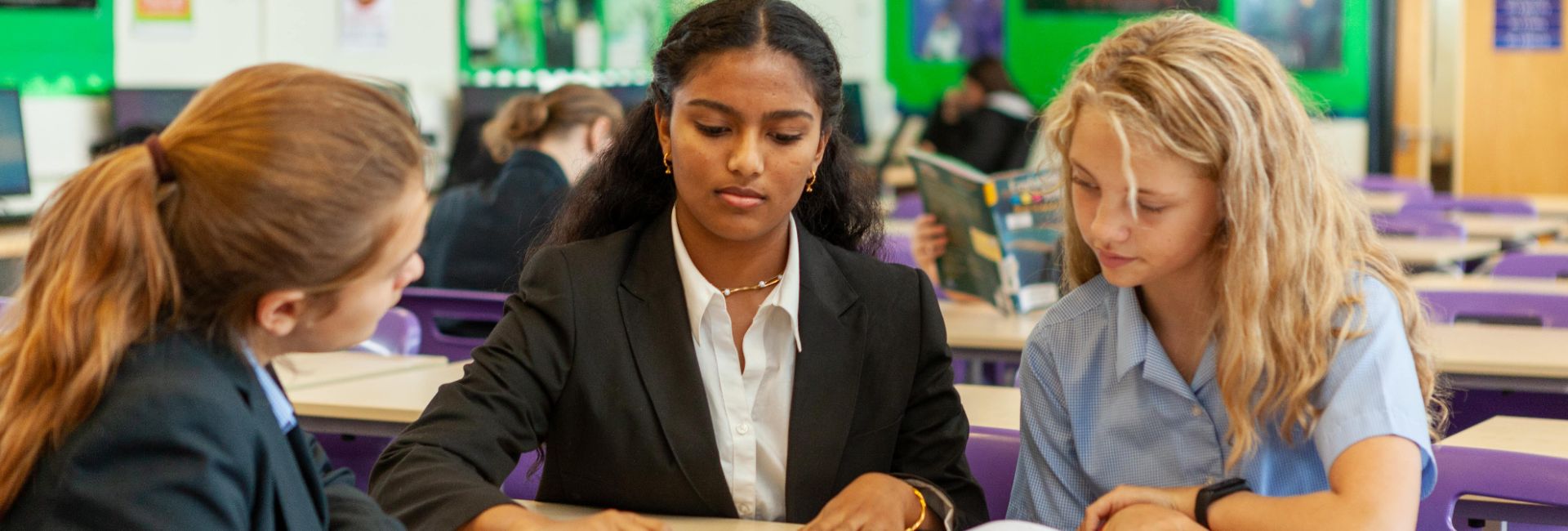SEND at TGGS
Our SEND team:
- Ruth Stacey (Special Educational Needs and Disability Coordinator – ‘SENDCo’) - send@tggsacademy.org
- Liz McGarry (Assistant SENDCo) - lmcgarry@tggsacademy.org
- Silvia Stones - (ASD Lead) - sstones@tggsacademy.org
- Antje Jaeger (SEMH Lead) - ajaeger@tggsacademy.org
SEND Provision at TGGS:
A pupil has SEND if they have a learning difficulty or disability which calls for special educational provision to be made for them.
They have a learning difficulty or disability if they have:
- A significantly greater difficulty in learning than the majority of others of the same age, or
- A disability which prevents or hinders them from making use of facilities of a kind generally provided for others of the same age in mainstream schools
Special educational provision is educational or training provision that is additional to, or different from, that made generally for other children or young people of the same age by mainstream schools.
If you have any queries please do not hesitate to contact the school SENDCo at the email address provided above.
TGGS SEND Information, Plans and Policies:
- SEND Policy
- SEND Information Report (local offer)
- School Accessibility Plan
- Supporting Medical Needs Policy
- Suspension Policy
- Policy on Word Processing in Examinations
SEND Local Information:
- Local Offer - Links to further information about the Local Offer in your area: Torbay | Devon County
- SENDIASS - For Information, Advice and Support on SEND please follow the link to SENDIASS Torbay: http://sendiasstorbay.org/
- DEVONIAS - For Information, Advice and Support on SEND please follow the link to DEVONIAS Devon: https://www.devonias.org.uk/
- Snippets - A weekly round-up of information relating to Children With Additional Needs, produced by Signpost Plus, from Children and Family Health Devon:Signpost Plus - Children and Family Health (childrenandfamilyhealthdevon.nhs.uk)
SEND – Useful Links:
- SEND code of practice: 0 to 25 years: https://www.gov.uk/government/publications/send-code-of-practice-0-to-25
Guidance on the special educational needs and disability (SEND) system for children and young people aged 0 to 25, from 1 September 2014.
- Equality Act 2010: https://www.gov.uk/guidance/equality-act-2010-guidance
- Special educational needs and disability - SEND Torbay Council: http://www.torbay.gov.uk/schools-and-learning/send/
Find support, guidance and information for parents and carers of children and young people with special educational needs and disabilities.
- Special educational needs and disability – Devon County Council https://www.devon.gov.uk/children-families-education/send-local-offer/
Devon’s SEND Local Offer is the education, health and social care services and support for children and young people with special educational needs and disabilities (SEND) from birth to 25.
- Parent / Carer – British Dyslexia Association: http://www.bdadyslexia.org.uk/parent
The information contained within this section looks at indicators of specific learning difficulties, as well as supporting your child both at home and within the education system to ensure that they achieve the best possible outcomes.
- Eyes and Dyslexia / British Dyslexia Association: http://www.bdadyslexia.org.uk/dyslexic/eyes-and-dyslexia
On this page you will find information regarding: Visual Stress, Finding a specialist practitioner, Resources, Aids for visual stress, Further reading.
- About Dyspraxia / Dyspraxia Foundation: https://dyspraxiafoundation.co.uk/children-and-families
Dyspraxia, a form of developmental coordination disorder (DCD) is a common disorder affecting fine and/or gross motor coordination in children and adults.
- Dysgraphia Help – About Dysgraphia: https://dyslexiaida.org/understanding-dysgraphia/
What is dysgraphia? What causes dysgraphia? Why is diagnosis of dysgraphia and related learning disabilities important?
- Dyscalculia / British Dyslexia Association: https://www.bdadyslexia.org.uk/dyscalculia
Dyscalculia is usually perceived of as a specific learning difficulty for mathematics, or, more appropriately, arithmetic.
- Hearing Impairment / Childhood Deafness: https://www.ndcs.org.uk/information-and-support/childhood-deafness/
Help and information for the one in six people in the UK who have some degree of hearing impairment or deafness.
- Visual impairment / Disability: https://www.rnib.org.uk/information-everyday-living-family-friends-and-carers/understanding-your-childs-eye-condition
Understanding vision impairment in children and young people – first steps
- What is Autism? The National Autistic Society: https://www.autism.org.uk/advice-and-guidance/what-is-autism
Autism is a lifelong, developmental disability that affects how a person communicates with, and relates to, other people and the world around them.
- Disabled Students Allowance –Welcome to GOV.UK: https://www.gov.uk/disabled-students-allowances-dsas
Sixth Form university applications - You can apply for Disabled Students’ Allowances (DSAs) to cover some of the extra costs you have because of a mental health problem, long term illness or any other disability. You can get the allowances on top of your other student finance. You won’t need to repay DSAs.
- National Association of Special Needs: http://www.nasen.org.uk/
NASEN is a charity organisation who have been operating since 1992. The organisation supports thousands of practitioners by providing relevant information, training and resources to enable staff to meet all pupils’ needs. Working with dedicated education professionals, NASEN aims to ensure that practice for special and additional needs is both effective and current.
- Extra SEN Support / Disability charity Scope UK: https://www.scope.org.uk/advice-and-support/where-to-get-educational-support/
If your child has a condition or impairment, they can get extra support and adjustments at school.
- Talking to your teenager – Live Well – NHS Choices: https://www.livewellsouthwest.co.uk/inpatient-mental-health-neurology
Advice and tips for parents on talking to teenagers and getting them to open up about what's bothering them.
- Children and young people / Mind – the mental health charity: https://www.mind.org.uk/information-support/guides-to-support-and-services/children-and-young-people/
Gives information about where children and young people can get support with a mental health problem.






